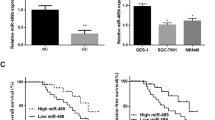Abstract
Recently, microRNA-498 (miR-498) plays important effect in human cancers. Nonetheless, the role of miR-498 is still unclear in gastric cancer (GC). Therefore, this study was designed to investigate the function of miR-498 in GC tissues and cell lines (SGC-7901, BGC-823, MGC-803). The expressions of miR-498 and BMI-1 were examined in GC tissues via the RT-qPCR assay. The function of miR-498 was investigated through MTT and transwell assays. The relationship between miR-498 and BMI-1 was testified by dual luciferase assay. The protein expression of EMT markers, AKT pathway markers and BMI-1 was measured through western blot. The expression of miR-498 was decreased in GC tissues which predicted poor prognosis of GC patients. Moreover, functional analyses show that the overexpression of miR-498 inhibited the progression of GC. Furthermore, BMI-1 was a direct target of miR-498 which was upregulated in GC. Especially, the upregulation of BMI-1 recovered the suppressive effect of miR-498 in GC. In addition, miR-498 inhibited the metastasis and proliferation of GC cells through blocking EMT and AKT pathway. MiR-498, by targeting BMI-1, presents a plethora of tumor suppressor activities in GC cells.






Similar content being viewed by others
Data availability
The datasets used and/or analyzed during the present study are available from the corresponding author on reasonable request.
References
Piazuelo MB, Correa P. Gastric cancer: overview. Colomb Med. 2013;44(3):192–201.
Siegel RL, Miller KD, Jemal A. Cancer statistics, 2015. CA Cancer J Clin. 2015;65(1):5–29. https://doi.org/10.3322/caac.21254.
Yang L. Incidence and mortality of gastric cancer in China. World J Gastroenterol. 2006;12(1):17–20.
Jing JJ, Liu HY, Hao JK, Wang LN, Wang YP, Sun LH, et al. Gastric cancer incidence and mortality in Zhuanghe, China, between 2005 and 2010. World J Gastroenterol. 2012;18(11):1262–9. https://doi.org/10.3748/wjg.v18.i11.1262.
Fujita T. Gastric cancer. Lancet. 2009;374(9701):1593–4. https://doi.org/10.1016/s0140-6736(09)61946-2(author reply 4–5).
Kim JG, Ryoo BY, Park YH, Kim BS, Kim TY, Im YH, et al. Prognostic factors for survival of patients with advanced gastric cancer treated with cisplatin-based chemotherapy. Cancer Chemother Pharmacol. 2008;61(2):301–7. https://doi.org/10.1007/s00280-007-0476-x.
Torre LA, Bray F, Siegel RL, Ferlay J, Lortet-Tieulent J, Jemal A. Global cancer statistics, 2012. CA Cancer J Clin. 2015;65(2):87–108. https://doi.org/10.3322/caac.21262.
Choi YY, Noh SH, Cheong JH. Evolution of gastric cancer treatment: from the golden age of surgery to an era of precision medicine. Yonsei Med J. 2015;56(5):1177–85. https://doi.org/10.3349/ymj.2015.56.5.1177.
Cervantes A, Rosello S, Roda D, Rodriguez-Braun E. The treatment of advanced gastric cancer: current strategies and future perspectives. Ann Oncol. 2008;19(Suppl 5):v103–7. https://doi.org/10.1093/annonc/mdn321.
Kloosterman WP, Plasterk RH. The diverse functions of microRNAs in animal development and disease. Dev Cell. 2006;11(4):441–50. https://doi.org/10.1016/j.devcel.2006.09.009.
Cui HB, Ge HE, Wang YS, Bai XY. MiR-208a enhances cell proliferation and invasion of gastric cancer by targeting SFRP1 and negatively regulating MEG3. Int J Biochem Cell Biol. 2018;102:31–9. https://doi.org/10.1016/j.biocel.2018.06.004.
Gao W, Cao Y, Guo P, Bao X, Zhu H, Zheng J, et al. Downregulation of MiR-1297 predicts poor prognosis and enhances gastric cancer cell growth by targeting CREB1. Biomed Pharmacother. 2018;105:413–9. https://doi.org/10.1016/j.biopha.2018.05.094.
An JX, Ma MH, Zhang CD, Shao S, Zhou NM, Dai DQ. MiR-1236-3p inhibits invasion and metastasis in gastric cancer by targeting MTA2. Cancer Cell Int. 2018;18:66. https://doi.org/10.1186/s12935-018-0560-9.
Yan Q, Li W, Tang Q, Yao S, Lv Z, Feng N, et al. Cellular microRNAs 498 and 320d regulate herpes simplex virus 1 induction of Kaposi’s sarcoma-associated herpesvirus lytic replication by targeting RTA. PLoS One. 2013;8(2):e55832. https://doi.org/10.1371/journal.pone.0055832.
Liu R, Liu F, Li L, Sun M, Chen K. MiR-498 regulated FOXO3 expression and inhibited the proliferation of human ovarian cancer cells. Biomed Pharmacother. 2015;72:52–7. https://doi.org/10.1016/j.biopha.2015.04.005.
Yang L, Wei N, Wang L, Wang X, Liu QH. MiR-498 promotes cell proliferation and inhibits cell apoptosis in retinoblastoma by directly targeting CCPG1. Child’s Nerv Syst. 2018;34(3):417–22. https://doi.org/10.1007/s00381-017-3622-8.
Montanini L, Lasagna L, Barili V, Jonstrup SP, Murgia A, Pazzaglia L, et al. MicroRNA cloning and sequencing in osteosarcoma cell lines: differential role of miR-93. Cell Oncol. 2012;35(1):29–41. https://doi.org/10.1007/s13402-011-0059-z.
Tu Y, Gao X, Li G, Fu H, Cui D, Liu H, et al. MicroRNA-218 inhibits glioma invasion, migration, proliferation, and cancer stem-like cell self-renewal by targeting the polycomb group gene Bmi1. Cancer Res. 2013;73(19):6046–55. https://doi.org/10.1158/0008-5472.CAN-13-0358.
Qi X, Li J, Zhou C, Lv C, Tian M. MicroRNA-320a inhibits cell proliferation, migration and invasion by targeting BMI-1 in nasopharyngeal carcinoma. FEBS Lett. 2014;588(20):3732–8. https://doi.org/10.1016/j.febslet.2014.08.021.
Gong XF, Yu AL, Tang J, Wang CL, He JR, Chen GQ, et al. MicroRNA-630 inhibits breast cancer progression by directly targeting BMI1. Exp Cell Res. 2018;362(2):378–85. https://doi.org/10.1016/j.yexcr.2017.11.039.
Luo H, Yang R, Li C, Tong Y, Fan L, Liu X, et al. MicroRNA-139-5p inhibits bladder cancer proliferation and self-renewal by targeting the Bmi1 oncogene. Tumour Biol. 2017;39(7):1010428317718414. https://doi.org/10.1177/1010428317718414.
Zhou L, Zhang WG, Wang DS, Tao KS, Song WJ, Dou KF. MicroRNA-183 is involved in cell proliferation, survival and poor prognosis in pancreatic ductal adenocarcinoma by regulating Bmi-1. Oncol Rep. 2014;32(4):1734–40. https://doi.org/10.3892/or.2014.3374.
Dong P, Kaneuchi M, Watari H, Hamada J, Sudo S, Ju J, et al. MicroRNA-194 inhibits epithelial to mesenchymal transition of endometrial cancer cells by targeting oncogene BMI-1. Mol Cancer. 2011;10:99. https://doi.org/10.1186/1476-4598-10-99.
Wu DM, Hong XW, Wang LL, Cui XF, Lu J, Chen GQ, et al. MicroRNA-17 inhibition overcomes chemoresistance and suppresses epithelial-mesenchymal transition through a DEDD-dependent mechanism in gastric cancer. Int J Biochem Cell Biol. 2018. https://doi.org/10.1016/j.biocel.2018.06.007.
Bellacosa A, Kumar CC, Di Cristofano A, Testa JR. Activation of AKT kinases in cancer: implications for therapeutic targeting. Adv Cancer Res. 2005;94:29–86. https://doi.org/10.1016/S0065-230X(05)94002-5.
Cheng F, Yang Z, Huang F, Yin L, Yan G, Gong G. MicroRNA-107 inhibits gastric cancer cell proliferation and metastasis by targeting PI3K/AKT pathway. Microb Pathog. 2018;121:110–4. https://doi.org/10.1016/j.micpath.2018.04.060.
Porta C, Paglino C, Mosca A. Targeting PI3K/Akt/mTOR signaling in cancer. Front Oncol. 2014;4:64. https://doi.org/10.3389/fonc.2014.00064.
He Y, Ge Y, Jiang M, Zhou J, Luo D, Fan H, et al. MiR-592 promotes gastric cancer proliferation, migration, and invasion through the PI3K/AKT and MAPK/ERK signaling pathways by targeting Spry2. Cell Physiol Biochem. 2018;47(4):1465–81. https://doi.org/10.1159/000490839.
Tian L, Zhao Z, Xie L, Zhu J. MiR-361-5p inhibits the mobility of gastric cancer cells through suppressing epithelial-mesenchymal transition via the Wnt/beta-catenin pathway. Gene. 2018. https://doi.org/10.1016/j.gene.2018.06.095.
Zhao T, Chen Y, Sheng S, Wu Y, Zhang T. Upregulating microRNA-498 inhibits gastric cancer proliferation invasion and chemoresistance through inverse interaction of Bmi1. Cancer Gene Ther. 2018. https://doi.org/10.1038/s41417-018-0065-7.
Kang Y, Massague J. Epithelial-mesenchymal transitions: twist in development and metastasis. Cell. 2004;118(3):277–9. https://doi.org/10.1016/j.cell.2004.07.011.
Gupta GP, Massague J. Cancer metastasis: building a framework. Cell. 2006;127(4):679–95. https://doi.org/10.1016/j.cell.2006.11.001.
Li D, Tian B, Jin X. MiR-630 inhibits epithelial-to-mesenchymal transition (EMT) by regulating Wnt/betacatenin pathway in gastric cancer cells. Oncol Res. 2018. https://doi.org/10.3727/096504018X15178732625479.
Gopalan V, Smith RA, Lam AK. Downregulation of microRNA-498 in colorectal cancers and its cellular effects. Exp Cell Res. 2015;330(2):423–8. https://doi.org/10.1016/j.yexcr.2014.08.006.
Cong J, Liu R, Wang X, Wang J, Wang H, Hou J. Low miR-498 expression levels are associated with poor prognosis in ovarian cancer. Eur Rev Med Pharmacol Sci. 2015;19(24):4762–5.
Farazi TA, Juranek SA, Tuschl T. The growing catalog of small RNAs and their association with distinct Argonaute/Piwi family members. Development. 2008;135(7):1201–14. https://doi.org/10.1242/dev.005629.
Gao N, Wang FX, Wang G, Zhao QS. Targeting the HMGA2 oncogene by miR-498 inhibits non-small cell lung cancer biological behaviors. Eur Rev Med Pharmacol Sci. 2018;22(6):1693–9. https://doi.org/10.26355/eurrev_201803_14582.
Liu PW, Lin Y, Chen XY. Expression of B-cell-specific Moloney murine leukemia virus integration site 1 mRNA and protein in gastric cancer. J Dig Dis. 2014;15(4):166–73. https://doi.org/10.1111/1751-2980.12129.
Gao FL, Li WS, Liu CL, Zhao GQ. Silencing Bmi-1 enhances the senescence and decreases the metastasis of human gastric cancer cells. World J Gastroenterol. 2013;19(46):8764–9. https://doi.org/10.3748/wjg.v19.i46.8764.
Shan ZN, Tian R, Zhang M, Gui ZH, Wu J, Ding M, et al. MiR128-1 inhibits the growth of glioblastoma multiforme and glioma stem-like cells via targeting BMI1 and E2F3. Oncotarget. 2016;7(48):78813–26. https://doi.org/10.18632/oncotarget.12385.
Wu SQ, Niu WY, Li YP, Huang HB, Zhan R. MiR-203 inhibits cell growth and regulates G1/S transition by targeting Bmi-1 in myeloma cells. Mol Med Rep. 2016;14(5):4795–801. https://doi.org/10.3892/mmr.2016.5832.
Deng Y, Xiong Y, Liu Y. MiR-376c inhibits cervical cancer cell proliferation and invasion by targeting BMI1. Int J Exp Pathol. 2016;97(3):257–65. https://doi.org/10.1111/iep.12177.
Li F, Liang A, Lv Y, Liu G, Jiang A, Liu P. MicroRNA-200c inhibits epithelial-mesenchymal transition by targeting the BMI-1 gene through the phospho-AKT pathway in endometrial carcinoma cells in vitro. Med Sci Monit. 2017;23:5139–49.
Will M, Qin AC, Toy W, Yao Z, Rodrik-Outmezguine V, Schneider C, et al. Rapid induction of apoptosis by PI3K inhibitors is dependent upon their transient inhibition of RAS-ERK signaling. Cancer Discov. 2014;4(3):334–47. https://doi.org/10.1158/2159-8290.CD-13-0611.
Liu GL, Yang HJ, Liu B, Liu T. Effects of MicroRNA-19b on the proliferation, apoptosis, and migration of wilms’ tumor cells via the PTEN/PI3K/AKT signaling pathway. J Cell Biochem. 2017;118(10):3424–34. https://doi.org/10.1002/jcb.25999.
Long ZW, Wu JH, Cai H, Wang YN, Zhou Y. MiR-374b promotes proliferation and inhibits apoptosis of human GIST cells by inhibiting PTEN through activation of the PI3K/Akt pathway. Mol Cells. 2018;41(6):532–44. https://doi.org/10.14348/molcells.2018.2211.
Xiao F, Cheng Z, Wang P, Gong B, Huang H, Xing Y, et al. MicroRNA-28-5p inhibits the migration and invasion of gastric cancer cells by suppressing AKT phosphorylation. Oncol Lett. 2018;15(6):9777–85. https://doi.org/10.3892/ol.2018.8603.
Author information
Authors and Affiliations
Corresponding author
Ethics declarations
Conflict of interest
The authors declare that they have no conflict of interests.
Ethical approval
This study was approved by the Institutional Ethics Committee of The Affiliated Hospital of Qingdao University (Qingdao, China) and was performed according to the guidelines of the Declaration of Helsinki. Informed consent was obtained from all patients.
Additional information
Publisher's Note
Springer Nature remains neutral with regard to jurisdictional claims in published maps and institutional affiliations.
Dong You, Dawei Wang, Peiji Liu are the co-first authors.
Electronic supplementary material
Below is the link to the electronic supplementary material.
Rights and permissions
About this article
Cite this article
You, D., Wang, D., Liu, P. et al. MicroRNA-498 inhibits the proliferation, migration and invasion of gastric cancer through targeting BMI-1 and suppressing AKT pathway. Human Cell 33, 366–376 (2020). https://doi.org/10.1007/s13577-019-00313-w
Received:
Accepted:
Published:
Issue Date:
DOI: https://doi.org/10.1007/s13577-019-00313-w




